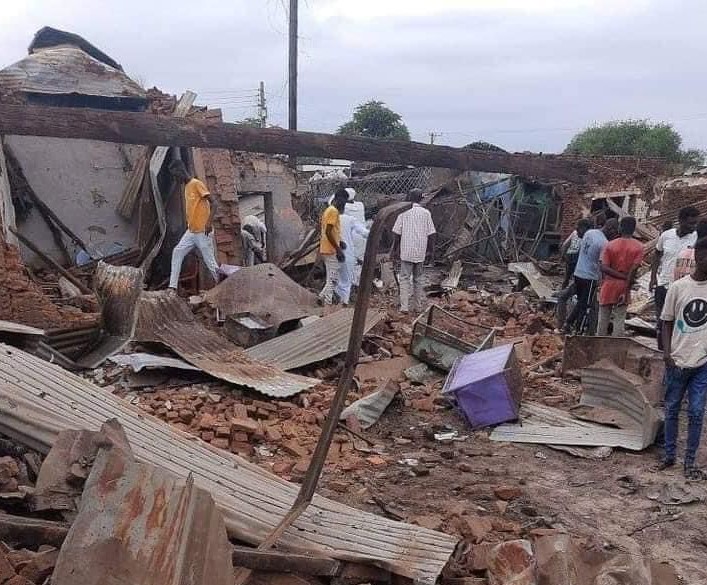Picking up the pieces as Darfur and Khartoum battles abate

War devastation in Nyala, capital of South Darfur (Photo: RD)
Mahmoud Abdelaziz, director of the Nyala University Training and Capacity Building Centre, said that Nyala, capital of South Darfur, is one of the most affected cities after Khartoum state. The Rapid Support Forces (RSF) continue to besiege Hasaheisa camp in Zalingei, Central Darfur, for the third week in a row.
The security, economic, and health situation in Nyala are especially in decline, Abdelaziz said. He told Radio Dabanga that battles and shelling between the 16th Infantry Division of the Sudan Armed Forces (SAF) and paramilitary RSF displaced a large number of residents and left entire neighbourhoods deserted.
The amount of direct battles has decreased in Nyala. Battles that have taken place are focused on mutual artillery shelling, indicating that the RSF set up their artillery base in eastern Nyala. The RSF has repeatedly bombed the command of the 16th Infantry Division in Nyala, causing damage to the neighbourhoods of El Jir and El Nahda, located west and northwest of the military base.
The battles that took place recently also caused “great damage” to the markets, said Abdelaziz. This has caused further deterioration of the economic situation.
Residents have begun to return to the southern and eastern neighbourhoods of the capital, including Teksas, Karari, Mousa, El Jebel, and Teiba. Heavy troop presence and stray ammunition make it difficult for citizens to travel from the south to the north of Nyala, where it is safer, he said.
“Residents of southern Nyala have moved to Kadira market in Teksas neighbourhood due to looting and vandalism at the market in their neighbourhood,” Abdelaziz said. “The RSF demanded the merchants to open the market, but the merchants are being cautious.”
Abdelaziz confirmed a “terrible deterioration” in health services in the city as the Turkish Hospital is short of medical staff, medicines, and equipment. The emergency personnel at the hospital have begun treating wounded RSF fighters as well, he said, “which reduces the chances of citizens”.
A lack of electricity, water, and internet is also affecting the work of health services and pausing financial transfers, along with making information sharing difficult, according to Abdelaziz. Electricity and water has been cut off for four months in Nyala’s neighbourhoods.
Listeners told Radio Dabanga that the RSF besieged the city from three directions on September 23.
According to the Darfur Bar Association (DBA), the RSF is reinforcing its combat capabilities in the already war-torn western region. The lawyers warned of more tribal violence in Darfur as the United Arab Emirates allegedly continues to send arms to the militia.
Hasaheisa camp siege
The RSF siege of the Hasaheisa camp in Zalingei entered its third week on Monday. The paramilitary force is preventing the entry of food and water under the pretext that the displaced are supplying the army with water.
Sheikh Abdelrazzag Yousef, a displaced community leader, told Radio Dabanga that the siege has negatively impacted the camp residents’ health. The depletion of medicines has led citizens to resort to herbal medicines.
He pointed out the significant increase in the prices of basic commodities in the camp as a result of the siege. The price of a pound of sugar is now SDG1,700 ($3.80), a bottle of oil SDG3,000 ($6.71), laundry soap SDG700 ($1.56), a kilo of meat SDG5,000 ($11.18), and a loaf of bread SDG200 ($0.45).
“The RSF confiscated 20 lorries loaded with food supplies on their way to the Hasaheisa camp between Saturday and Monday,” he said. He appealed to the RSF leaders to “lift the siege on defenceless civilians in Zalingei.” He also called on the international community to intervene immediately.
Khartoum shelling
Artillery shelling continued in large parts of Khartoum and Omdurman on Monday, while the amount of shelling from Omdurman’s Karari military base decreased.
In Karari in northern Omdurman, the water supply is still cut off after the El Manara water station was bombed by the RSF last week.
Residents told Radio Dabanga that projectiles fell on El Wadi Street in Omdurman on Monday. Omdurman residents said that shells fell on Sabreen Market on Sunday, causing an unknown loss of lives.
Witnesses told Radio Dabanga that the vicinity of the radio and television building in Omdurman witnessed the hitherto fiercest battles of its kind at dawn on Sunday.
Several neighbourhoods in Khartoum also witnessed artillery shelling, while Jebel Aulia witnessed violent artillery shelling. Witnesses told Radio Dabanga that the RSF stormed villages west of Jebel Aulia for the second day in a row and continued to attack civilians.
The neighbourhoods of southern Khartoum, including El Kalakla, witnessed relative calm as people began to go about their normal lives, including playing football matches and visiting the mosque.
According to the latest update of the International Organisation for Migration’s Displacement Tracking Matrix, more than 4,633,930 people have been displaced in Sudan, as of October 24. 3,182,405 people have been reportedly displaced from Khartoum state, 670,066 from South Darfur, and 184,430 from Central Darfur.
The official Central Bank of Sudan (CBoS) exchange rate of the US Dollar ($) to SDG (Sudanese Pound) was SDG447 on October 24. The US Dollar exchange rate on the parallel market approached SDG1.000.











 and then
and then